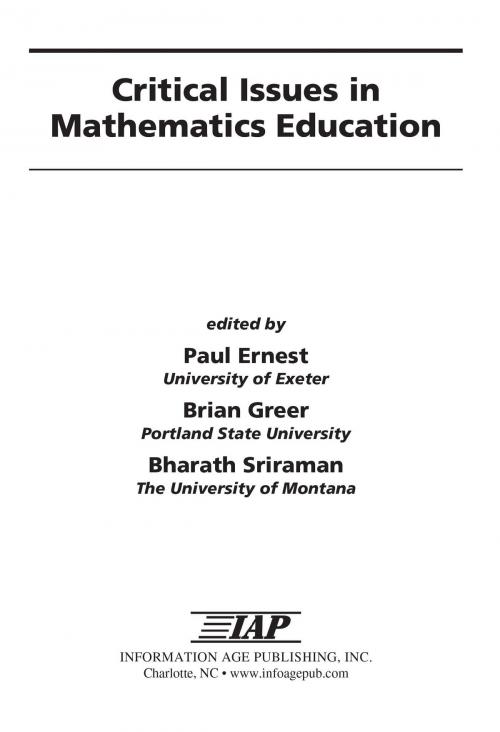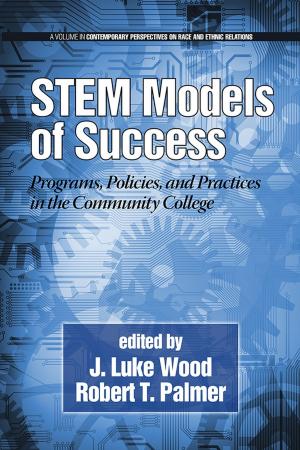Critical Issues in Mathematics Education
Nonfiction, Science & Nature, Mathematics, Study & Teaching, Reference & Language, Education & Teaching, Teaching, Teaching Methods| Author: | ISBN: | 9781607522188 | |
| Publisher: | Information Age Publishing | Publication: | June 1, 2009 |
| Imprint: | Information Age Publishing | Language: | English |
| Author: | |
| ISBN: | 9781607522188 |
| Publisher: | Information Age Publishing |
| Publication: | June 1, 2009 |
| Imprint: | Information Age Publishing |
| Language: | English |
The word "critical" in the title of this collection has three meanings, all of which are relevant. One meaning, as applied to a situation or problem, is "at a point of crisis". A second meaning is "expressing adverse or disapproving comments or judgments". A third is related to the verb "to critique", meaning "to analyze the merits and faults of". The authors contributing to this book pose challenging questions, from multiple perspectives, about the roles of mathematics in society and the implications for education. Traditional reasons for teaching mathematics include: preparing a new generation of mathematics researchers and a cadre of technically competent users of mathematics; training students to think logically; and because mathematics is as much part of cultural heritage as literature or music. These reasons remain valid, though open to critique, but a deeper analysis is required that recognizes the roles of mathematics in framing many aspects of contemporary society, that will connect mathematics education to the lived experiences of students, their communities, and society in general, and that acknowledges the global ethical responsibilities of mathematicians and mathematics educators. The book is organized in four sections (1) Mathematics education: For what and why? (2) Globalization and cultural diversity, (3) Mathematics, education, and society and (4) Social justice in, and through, mathematics education The chapters address fundamental issues such as the relevance of school mathematics in people's lives; creating a sense of agency for the field of mathematics education, and redefining the relationship between mathematics as discipline, mathematics as school subject and mathematics as part of people's lives.
The word "critical" in the title of this collection has three meanings, all of which are relevant. One meaning, as applied to a situation or problem, is "at a point of crisis". A second meaning is "expressing adverse or disapproving comments or judgments". A third is related to the verb "to critique", meaning "to analyze the merits and faults of". The authors contributing to this book pose challenging questions, from multiple perspectives, about the roles of mathematics in society and the implications for education. Traditional reasons for teaching mathematics include: preparing a new generation of mathematics researchers and a cadre of technically competent users of mathematics; training students to think logically; and because mathematics is as much part of cultural heritage as literature or music. These reasons remain valid, though open to critique, but a deeper analysis is required that recognizes the roles of mathematics in framing many aspects of contemporary society, that will connect mathematics education to the lived experiences of students, their communities, and society in general, and that acknowledges the global ethical responsibilities of mathematicians and mathematics educators. The book is organized in four sections (1) Mathematics education: For what and why? (2) Globalization and cultural diversity, (3) Mathematics, education, and society and (4) Social justice in, and through, mathematics education The chapters address fundamental issues such as the relevance of school mathematics in people's lives; creating a sense of agency for the field of mathematics education, and redefining the relationship between mathematics as discipline, mathematics as school subject and mathematics as part of people's lives.















